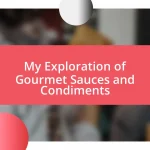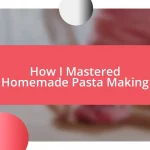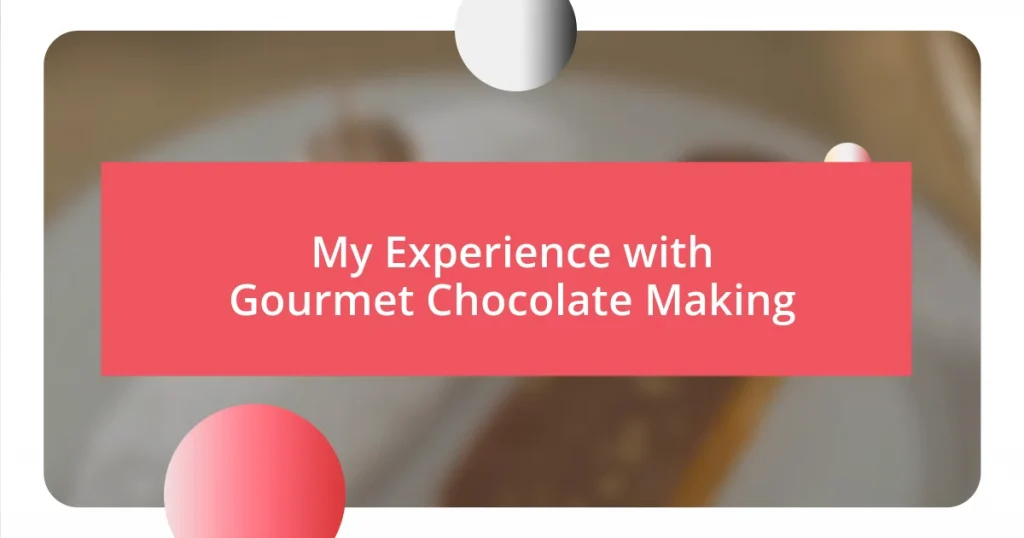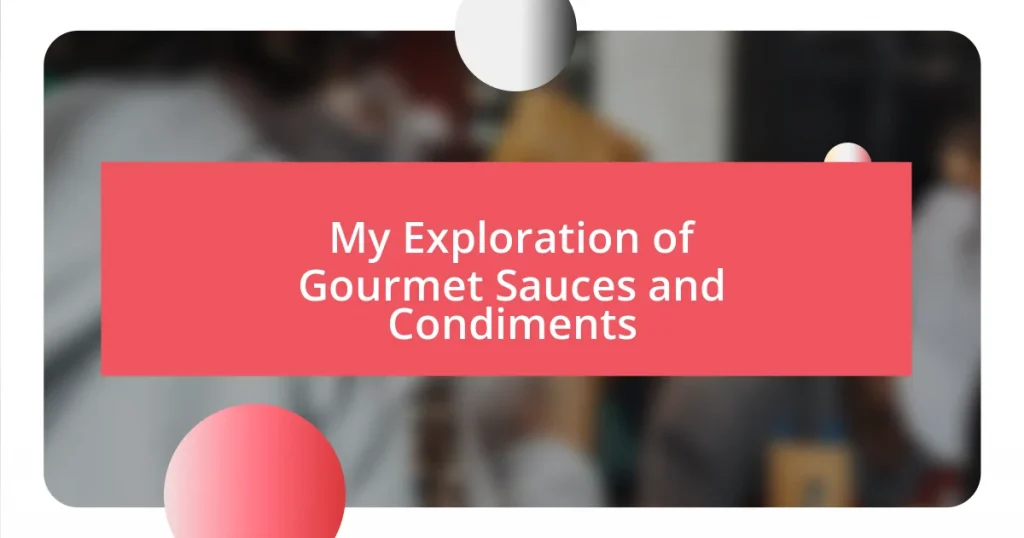Key takeaways:
- Kitchen tours provide an intimate glimpse into the lives and stories of chefs, fostering a sense of community and connection through shared culinary experiences.
- They offer valuable insights into different cooking techniques, cultural diversity, and sustainable practices, enriching participants’ culinary skills and philosophies.
- Effective engagement with hosts and organized note-taking can enhance the learning experience, allowing participants to apply newfound knowledge and inspiration in their own kitchens.

My perspective on kitchen tours
When I think about kitchen tours, I feel a rush of excitement. There’s something incredibly intimate about stepping into someone else’s culinary space. It’s like being granted a peek into their life. I remember one time, I toured a chef’s kitchen in a cozy little town, and I was mesmerized by the organized chaos of spices and pots. How does one create such a personal, inviting atmosphere?
What strikes me the most during these tours is the stories each kitchen tells. The worn cutting board in the corner, the handwritten recipes stuck to the fridge – these details create a narrative that reflects the owner’s passion and history. I can’t help but wonder, what meals have been prepared in that space? Each item feels like a memory, and I find myself wanting to linger, to ask questions, to learn more.
Moreover, I appreciate how kitchen tours foster a sense of community. They invite us to share our culinary experiences, sparking conversations that often lead to deeper connections. After a recent tour, I exchanged recipes with a fellow food lover, which not only led to a new friendship but also countless dinners filled with laughter and delicious food. Don’t you think it’s amazing how something as simple as a kitchen can bring people together?

Benefits of kitchen tours
Visiting a kitchen through a tour opens your eyes to different cooking techniques and styles. I remember stepping into a modern kitchen where the chef showcased a sous-vide machine. Watching that process made me realize how it could elevate my own cooking! It’s like attending a masterclass right in someone’s own space. By seeing tools and methods firsthand, I found inspiration to revamp my food preparation.
Another profound benefit of kitchen tours is their ability to teach us about demographics and cultural diversity. When I visited a traditional family kitchen, the warmth of the spices and the stories shared by the matriarch about her grandmother’s recipes transported me to another place. This experience deepened my appreciation for different cuisines and the stories attached to them. How can one resist the allure of flavors intertwined with history?
Lastly, kitchen tours encourage sustainable practices and innovative ideas. Observing how a particular chef utilizes every part of a vegetable opened my eyes to waste reduction tactics. In my own cooking, I now incorporate similar methods. It’s empowering to gain insights that not only enhance our culinary skills but also contribute to a more sustainable environment. Doesn’t it feel good to know that each small change can make a difference?
| Benefit | Details |
|---|---|
| Techniques Learned | Inspiration from observing others |
| Cultural Appreciation | Insights into traditions and recipe stories |
| Sustainability Practices | Innovative ideas to reduce waste |

Preparing for a kitchen tour
Preparing for a kitchen tour can be as exciting as the experience itself. I always jot down questions and topics I want to explore beforehand, ensuring that I maximize my time and insights. For instance, during a recent tour, I was curious about the chef’s favorite pantry staples and ended up discovering a new spice that I now can’t live without.
Here are some tips to help you get ready for your next kitchen tour:
- Research the kitchen: Look up the chef or owner’s background; understanding their journey can enrich your experience.
- List questions: Think about what aspects of the kitchen you’re most interested in—techniques, ingredients, or stories.
- Bring a notebook: Jot down insights, recipes, or ideas while on your tour to help you remember everything when you’re back home.
- Be respectful and curious: A kitchen is a personal space. Approach with an open mind and engage in conversations that feel natural.
Being prepared not only enhances your experience but also allows you to connect with the host on a deeper level. When I toured a bustling restaurant kitchen, my questions about their favorite seasonal dishes led to an enlightening discussion about the influence of local farmers—something I later brought into my own cooking philosophy.

Key features to observe
When observing key features during a kitchen tour, pay close attention to the layout and organization of the space. I once visited a small bakery where the chef’s careful arrangement made everything flow smoothly. Each tool had its designated spot, and it felt almost musical when she worked. Doesn’t it make you curious about how a well-organized kitchen impacts creativity and efficiency?
Lighting is another feature that can dramatically influence a kitchen’s atmosphere. During a late afternoon visit to a charming cottage kitchen, soft natural light poured through the window, illuminating the vibrant colors of fresh produce. The warm ambiance not only made the cooking process feel cozy but also inspired me to experiment with my own kitchen lighting. Isn’t it fascinating how light can shape our cooking experiences?
Don’t overlook the personal touches scattered throughout the kitchen. I found profound inspiration in an eclectic mix of cookbooks on a shelf during one of my tours, each with handwritten notes and stains from culinary adventures. It reminded me that a kitchen is not just a workspace—it tells the story of its owner. What stories might your kitchen reveal about your culinary journey?

Engaging with hosts effectively
The connection with hosts during kitchen tours can significantly enrich your experience. I remember a visit where the chef welcomed us with a homemade drink, instantly breaking the ice. Sharing food or drinks often opens up conversations that feel more personal, allowing you to ask thoughtful questions about their culinary inspirations and techniques. Have you ever noticed how a simple gesture can dissolve barriers and create a genuine connection?
Listening attentively also plays a crucial role when engaging with hosts. During one particular tour, I made it a point to really focus on the chef’s stories about their upbringing and cultural influences on their cooking. I was struck by how much passion radiated from them; it prompted me to consider how my own background shapes my cooking. In those moments, I realized that each dish tells a story, and the hosts are the narrators.
Offering genuine compliments can make a world of difference, too. After tasting a unique dish that the chef had prepared, I expressed my admiration not just for the flavors but for the technique used. This simple acknowledgment sparked a conversation on their creative process, revealing insights that I never would have considered otherwise. Have you ever thought about how your reactions could lead to deeper discussions? Engaging with hosts actively can illuminate paths of connection you might not expect.

Tips for taking notes
Taking notes during kitchen tours can elevate your understanding significantly. I often find it helpful to jot down observations on the spot, perhaps in a small notebook or even on my phone. When I visited a bustling gourmet kitchen last year, I made quick sketches of the setup, including where utensils were stored. These visuals helped me recall the organization more vividly later on and sparked ideas I could apply in my own space.
Another useful tip is to keep your notes organized by theme. For example, I would create sections for layout, gadgets, or ingredients used. During a memorable tour of a culinary school, I had some ingenious ideas about ingredient organization after observing their herb garden’s layout. This method transformed my scrawls from a random jumble into insightful little nuggets of inspiration I could reference later. How do you think structured notes could transform your cooking philosophy?
Lastly, don’t shy away from writing down specific phrases or quotes that resonate with you. I vividly remember a chef sharing, “Cooking is an exploration, not a destination.” That simple phrase has stuck with me and continues to influence my approach to cooking and kitchen organization. Capturing those impactful moments can ignite your creativity long after the tour is over. What powerful insights might you discover in your kitchen tours by sharpening your note-taking skills?

Applying insights from tours
I’ve found that applying insights from kitchen tours can be a game changer in the culinary world. On my last visit, a chef demonstrated a unique knife technique that I was instantly drawn to. I took a mental snapshot of his movements and later practiced it in my own kitchen, which not only improved my skills but also boosted my confidence. Have you ever experienced that “aha!” moment where something you observed directly influenced your practice?
Another important aspect is realizing that every kitchen has its own rhythm and style. During a tour, I noticed how a certain chef organized her workspace to maximize efficiency. I went home and rearranged my own kitchen tools, and the difference was astounding! It’s incredible how small shifts in organization can lead to tangible changes in productivity. Have you ever thought about how your kitchen’s layout might be holding you back from that effortless flow?
The emotional connections made during these tours can also provide lasting inspiration. After chatting with a host about the meaning behind an heirloom recipe, I felt a renewed passion for cooking that honors tradition. This inspired me to explore my family’s recipes more deeply, allowing me to blend my personal history with my culinary journey. Isn’t it fascinating how the stories behind food can transform not just our cooking, but our understanding of ourselves?















